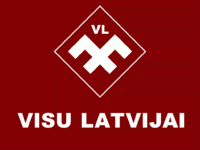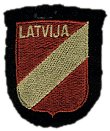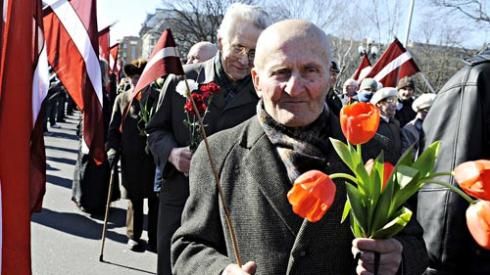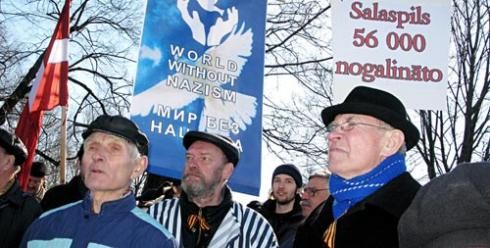Originally posted at www.thejc.com, published March 24, 20111
Where 1Hitler's thugs are treated as heroesWe go to Riga to find out why 2Latvians celebrate the men who murdered the country's Jews.
Latvia's Waffen-SS were marching again last week. Their objective was more modest than the one for which the army of 140,000 Latvian men was 3formed by the Nazis in 1943. Then they were recruited to help Germany occupy the Baltics, advance on Leningrad and defeat the Soviet army.
This time the challenge is to walk the short distance from the city of Riga's baroque cathedral, along the fat cobbles of the Latvian capital's elegant streets, past chic cafes and boutiques, to the towering Freedom Monument, the country's most potent symbol of independence. It should only be a 10-minute stroll, but it will take considerably longer for the handful of Waffen-SS veterans, all of whom are pushing 90 or over.
Although the annual event, known as Legionnaire's Day, is not sanctioned by the government, at least not since 2000, it enjoys the support of thousands of Latvians. 4Despite Prime Minister Valdis Dombrovskis's view that the march should be banned; despite criticism from the Russian government, and from the Simon Wiesenthal Centre's Efraim Zuroff who condemned the event as an attempt to glorify the SS and rewrite history; and despite opposition from Latvia's Russian-born minority and an attempt by Riga's ethnic Russian mayor to halt the march—the order was overturned at the 11th hour by the courts—still it goes ahead.
So on this beautiful, sunlit March morning, which is not quite mild enough to melt the hillocks of ice that line Riga's pavements, something is about to happen that to most people in Europe would seem repugnant. The old soldiers of an army that fought for Nazi Germany are about to be celebrated as national heroes.
Along an avenue lined with Latvia's red and white national flags, Waffen-SS units will be honoured with the laying of wreaths and the singing of folk songs. All this will happen to the hoots and jeers of the outnumbered Russian protestors grouped together within shouting distance of the Freedom Monument.
As the marchers gather in the square adjoining Riga's cathedral, the striking thing about those who are taking part is not the age of the veterans but the youth of their supporters. One of them is 18-year-old Oscar, who is wearing a shirt bearing an image of an advancing Waffen-SS division and military-style boots. He and his friends there appear to be in thrall to the fashion of fascism.
"Latvia has its own history," he says when I ask if he is aware that most of Europe will find his celebration of the Waffen-SS offensive. "If Europe suffered under the occupation of the Soviets, then they will understand the feelings here."
With this short answer, he sums up the argument used by the marchers and their supporters to defend what appears to be indefensible. The views that are being expressed here today are rooted in a Latvian national identity that had been suppressed by decades of Soviet communist occupation.
6One of Oscar's black-shirted colleagues gives his view. "There is a Legionnaires' song that is about a free Latvia. "It says that Latvians will fight all occupiers, whether they are Russian or German."
"The only possibility to fight against the communists was to join the Waffen-SS," adds Oscar.
None of which explains why young Latvian men such as Oscar and his friends, who belong to a party called the National Power, are drawn to dressing like the Gestapo. But maybe this does: "The Russian occupation is not over," says another in the group. "There is still Russian influence from Moscow. Jewish influence too." His country's membership of both the European Union and NATO is apparently of little relevance.
It appears that my questions have attracted some attention. A man standing among the black shirts conspicuously photographs me. Either he is trying to intimidate me—which to be honest, he does a little—or he thinks I am very attractive. I think probably the former.
But it is easy to make fun of a group that to many in the West appear as social misfits, rather like many of those who belong to our own, British far right. But a look around the cathedral square tells a different story. A few yards away there is another group. They appear to be very different from Oscar and his chums. The girls are pretty, the boys good looking, they wear jeans and beanie hats, the kind of student clothes that look good on any campus. With friendly smiles they hand out copies of a free newspaper called DDD which stands for the "De-Occupation, De-colonisation and De-Bolshevisation" of Latvia. It is published by the Latvian National Front whose website urges Latvian parents to bring their children to future marches celebrating the Waffen-SS.
And with a convoluted logic apparently attached to a campaign for Latvian post-Holocaust reparations, it not only manages to accuse Efraim Zuroff of antisemitism but "prominent Zionists" of "sticking their nose in Latvia's internal affairs", too.
There is, in fact, little if any fundamental difference between the teenagers wearing jeans and the black shirts. Everyone here is part of Latvia's nationalist movement.
8Among the flags being held aloft in the shadow of the cathedral is one from the All for Latvia! (AFL) party. In Latvia's parliament the AFL is the partner of the Fatherland and Freedom Party, one of the European far-right parties with which David Cameron has controversially allied his European MPs. Previous assurances from Cameron's Communities Secretary, Eric Pickles, that the marchers are merely commemorating those conscripted by the Nazis into the Waffen-SS sound less than convincing as 7the AFL flag, which looks remarkably like a swastika, flutters in the Baltic sun.
This is a country that lost 90 per cent of its Jews to the Holocaust. 9According to Zuroff, a Holocaust historian, only two thirds of Latvia's Waffen-SS were conscripted by the Nazis. The rest were volunteers, and many of those are thought to have been members of the killing squads that took part in some of the biggest massacres of Jews in the Holocaust.
I ask one of the many old men carrying red and white flowers which will be laid at the Freedom Monument, why he feels the need to commemorate the Waffen-SS. At 80-years-old, he is too young to have fought alongside the Nazis, but wishes he had.
"I feel a connection," he says. "I lost 15 family members to the Soviet occupation. 10We always support the SS because a lot of lies are told about them."
I ask what he thinks of those members of the Waffen-SS who are said to have been responsible for the massacre of his country's Jews. Should they also be commemorated?
Another old man, joins the conversation, but ignores the question. "Latvia was free before the Soviet occupation. We had aeroplanes and culture. The Russians took it away."
Jews will not be mentioned today, except by the Russian protesters at the monument. They carry placards listing the massacres that took place under the occupation of the Nazis, for whom the Latvian Waffen-SS fought. "36,000, Rumbala", says one, referring to a place not far south of Riga and the number of Jews who were killed there.
Not that the marchers will be taking any notice. The old men, the parents with children on their shoulders, the teenagers with their newspapers and the black shirts, all form an orderly queue behind a group of men carrying large Latvian flags, and as the sound of folk songs rises into the air, off they go on their parade.
Examination
Labeling Legionnaires as "Hitler's thugs" sets the tone for Nathan's fact-challenged anti-Latvian hatchet job. Legionnaires had no allegiance to Hitler or Nazism.
Accusing the Legion of killing Jews is a bald-faced lie. No one while in the service of the Legion has ever been accused of a war crime. Moreover, the contention that anyone would stage a public commemoration in honor of mass murderers is abhorrent — and speaks to what Nathan thinks of Latvians, not what Latvians think of Jews. Indeed, Latvia was the only pre-WWII country to ban anti-Semitic literature, and served as a transit country for Jews fleeing Hitler.
Nathan's ignorance of history is staggering. The Germans fully occupied the Baltics in July, 1941. The Latvian Legion was formed only in 1943 and had absolutely no treasonous role in subduing, or murdering, their fellow citizenry. Regarding those who volunteered for earlier police battalions serving on the Eastern Front, their motivation was to avenge their friends, relatives, and family who had been killed or deported during the Soviet occupation. For all, regardless of ultimately volunteered or conscripted, their only motivation was to prevent Soviet re-occupation, in the hopes of also eventually ridding themselves of the Germans, just as Latvians had after World War I to achieve independence.
The individuals Nathan mentions all denounce the commemoration to suit their own political agendas — even Efraim Zuroff, who has inserted himself in British domestic politics with baseless slander that the Tories associate themselves with Latvian Nazi-lovers.
Nathan would wish the reader to believe there is some mass movement denouncing Latvians for valid reasons, whereas what are actually taking place are self-serving ahistorical attacks. Rīgas "ethnic Russian mayor"'s grandfathers were both Soviet generals in World War II, recall, it was the Soviet Union which first invaded Latvia and had conducted its first mass deportations a week before the Nazi invasion — in which Jews suffered the most losses, proportionally, of any other group.
Regarding the signs portrayed:
- World Without Nazism is the Kremlin's hijacking of the moral cause of anti-Nazism primarily to denounce Estonians, Latvians, Lithuanians, and Ukrainians as fascists and Nazis.
- Salaspils claimed some 1,200, perhaps as many as 2,000 victims, not only Jews. Neither the sign—56,000—nor the Soviet era figures quoted for many years of 100,000 civilians and 200,000 Russian POWs dead are true.
Nathan never actually addresses the answer given, and that enshrined in Legion song, to drive out both Russians and Germans in a replay of the Latvian War of Independence. It is enough for Nathan to describe the individual as "black-shirted" to paint him as a Hitlerite thug.
 All for Latvia logo/flag
All for Latvia logo/flagThe only motivation of those serving in the Latvian Legion, regardless of mostly conscripted, some volunteered, was to combat the Red Army. Zuroff uses the crimes of the few—collaborators who were placed into the Legion when their units were dissolved and they were redeployed to the Eastern Front. Nathan leaves the impression that "many" of a third of the 140,000 murdered Jews. Even a third of a third would amount to 15,500 Holocaust collaborators, whereas Arajs Kommando—responsible for 26,000 murders under German supervision—numbered 300 to 500 during the Holocaust in Latvia while official trial records indicated as few as 100 to 200 members at the time. Current scholarship places the total number of Latvian collaborators, whether involved in killings or guard duty, digging pits... at 3,000. Most battalions did guard duty; collaborators were not entrusted with automatic weapons.
Arājs was tried and convicted in 1979 in Germany. Some 300 of his men were tried in the Soviet Union.
A year later, when asked directly in an interview on Latvian State Television LTV1 on March 16th, Zuroff admitted the "Latvian SS Legion was not involved in the crimes of the Holocaust." Even in his admission, Zuroff still maintained the trope of a "Latvian SS" organization, although even the Nazis called it the "Latvian Legion."
Whatever was said to Nathan, was not that Latvians support the criminal convicted-at-Nuremberg Nazi SS.
Behind the headline
Regardless of subsequent attempts to relate the event with less sensationalism, Nathan's article is crippled as journalism at the outset. He falsely contends that the Latvian Legion massacred Jews, and even helped the Nazis occupy the Baltic states.
We were curious about Nathan's politicizing the commemoration. A more complete quote of the section which included Nathan comparing a Latvian harvest fertility symbol to a Nazi swastika:
8“Among the flags being held aloft in the shadow of the cathedral is one from the All for Latvia! (AFL) party. In Latvia's parliament the AFL is the partner of the Fatherland and Freedom Party, one of the European far-right parties with which David Cameron has controversially allied his European MPs. Previous assurances from Cameron's Communities Secretary, Eric Pickles, that the marchers are merely commemorating those conscripted by the Nazis into the Waffen-SS sound less than convincing as 7the AFL flag, which looks remarkably like a swastika, flutters in the Baltic sun.”
Zuroff had been vehemently denouncing Pickles ever since the initiation of the Tory–conservative Latvian political relationship. Here, Nathan simply repeats the anti-Nazi activist anti-Tory party line.
Of more interest is that Nathan had attended the 2011 commemoration with "Russian-language" playwright Alexei Scherbak, who had written a drama, Remembrance Day, about the annual procession of Legionnaire veterans and the division it causes in families in Latvia today.2 The play was to be staged that April by the Royal Court.3 Nathan's similar, but separate, account of this same Rīga Legionnaire commemoration finishes on a more positive note:
Suddenly Scherbak's refusal to judge even those who fought for the SS seems to be one of the more moderate opinions being expressed on Riga's streets today.
We'll not beat the dead horse that the Latvian Legion did not fight "for" Hitler, "for" the Nazis, "for" the criminal SS, "for" Nazi domination of Europe, et al. ad nauseum. Rather, Nathan would do well to follow Scherbak's example. Understanding and reconciliation demand the Latvian Legion and its commemoration be examined and judged on facts, not specious allegations serving ahistorical personal agendas.
| 1 | John Nathan's article published at www.thejc.com/ |
| 2 | A search of the Latvian press turned up numerous articles on award-winning Russian-Latvian Aleksejs Ščerbaks and his plays, including "Piemiņas Diena" (Commemoration Day). Ščerbaks' works are regularly translated into Latvian and performed in Latvia. |
| 3 | Article available at archive.org, 'Remembrance Day': A hatred that refuses to die, retrieved 10 June 2015. |


